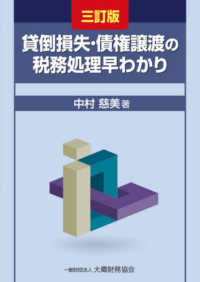- ホーム
- > 洋書
- > ドイツ書
- > Mathematics, Sciences & Technology
- > Medicine & Pharmacy
- > general survey & lexicons
Full Description
One of the few books to focus on the critical problem of the correct characterization of conflicting data for an adequate risk evaluation, this title comprehensively covers the different approaches in various research areas in the US and in Europe, while also considering the ethical implications of risk evaluation. In addition, special attention is paid to the sensitive topic of potential health risks through electromagnetic fields. Written by leading experts in the field, this is an indispensable resource for policy makers and professionals in health risk assessment.
Contents
Introduction FROM SCIENTIFIC ANALYSIS TO RISK POLICY Risk Assessment and Risk Communication for Electromagnetic Fields: A World Health Organization Perspective (T. Emilie van Deventer and Kenneth R. Foster) Characterizing Evidence and Policy Making (Evi Vogel and Ginevra Delfini) MAKING SENSE OF Principles and Evidence Characterization of the Data from Genetox Investigations (Gunter Obe and Vijayalaxmi) Animal Studies (Alexander Lerchl) Epidemiology (Joachim Schuz) Principles and Practice of Evidence Characterization in Environmental Clinical Case Studies (Caroline Herr and CHARACTERIZING EVIDENCE Characterizing Evidence with Evidence-based Medicine (Alexander Katalinic and Dagmar Luhmann) The IARC Monographs. Approach to Characterizing Evidence (Vincent James Cogliano, Robert Alexander Baan, Kurt Straif, Yann Grosse, Marie Beatrice Secretan, and Fatiha El Ghissassi) The Swiss Health Risk Approach (Martin Roosli) Procedures for Characterizing Evidence: German Commission on Radiation Protection (Norbert Leitgeb) Lessons from the California Electromagnetic Field Risk Assessment of 2002 (Raymond Richard Neutra) Evidence Maps - A Tool for Summarizing and Communicating Evidence in Risk Assessment (Holger Schutz, Peter M. Wiedemann, and Albena DATA AND UNCERTAINTY Perception of Uncertainty and Communication about unclear Risks (Peter Wiedemann, Holger Schutz, and Andrea Thalmann) Ethical Guidance for Dealing with Unclear Risk (Armin Grunwald) PRACTICAL IMPLICATIONS Lessons Learned: Recommendations for Communicating Conflicting Evidence for Risk Characterization (Peter Wiedemann, Franziska Borner, and Holger Schutz)






